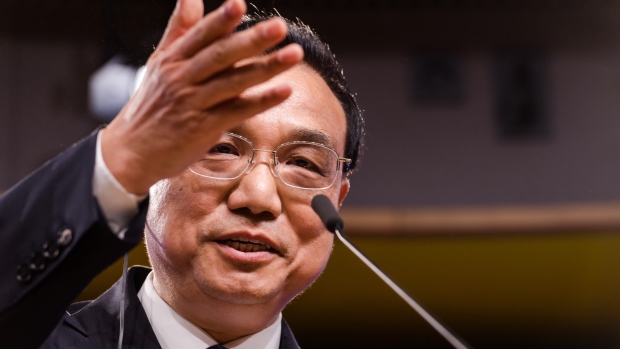Jun 19, 2019
U.S. CEOs to Meet China's Premier This Week as Trade Woes Simmer
, Bloomberg News

(Bloomberg) -- A group of chief executive officers of American corporations are set to meet with Chinese Premier Li Keqiang this week as the simmering trade war ensnares companies from both countries.
At least five CEOs of U.S. firms are attending a meeting in Beijing, people familiar with the matter said. Those include heads of chemical giant Dow Inc., United Parcel Service Inc., drugmaker Pfizer Inc. and Honeywell International Inc., said the people, asking not to be identified as the meeting isn’t public.
The event takes place just as the geopolitical tensions between the two powers enter a new phase. Since trade talks broke off in May, U.S. President Donald Trump has ordered additional tariffs on Chinese goods and blocked local champion Huawei Technologies Co., threatening to widen the ban to Chinese video-surveillance companies. Meanwhile, Beijing has clamped down on American corporations from Ford Motor Co. to FedEx Corp. and said it will create a blacklist of foreign firms that damage their Chinese counterparts.
The CEOs will be in the Chinese capital at a key moment, a week before Trump and China’s President Xi Jinping are set to meet on the sidelines of the Group of 20 summit in Japan. Trump said Tuesday that he had a “very good” phone conversation with Xi, and will hold an “extended meeting” with him in Osaka, triggering a rally in financial markets.
Company Risk
The company chieftains’ visit was scheduled ahead of time and isn’t necessarily a response to the tensions between the U.S. and China over trade, the people said. Representatives from as many as 15 non-Chinese companies will be meeting with Chinese Premier Li this week, they said.
China’s Foreign Ministry didn’t respond to a request for more details.
Becoming collateral damage in a geopolitical dispute is a perennial risk for foreign companies in China. South Korean firms learned that in 2017, after their government agreed to deploy the U.S. Thaad missile-defense system -- intended to safeguard against attacks by North Korea -- over Chinese objections.
Korea, Canada
Brands from Hyundai Motor Co. to Amorepacific Corp. saw sales plunge amid boycotts, K-pop performances were canceled and retail conglomerate Lotte Shopping Co. was forced to largely wind down its Chinese business after allowing one of its golf courses to be used for a Thaad battery.
Apple and Nike Brace for China’s Wrath After Huawei Ban
Canada has been at odds with China since December, when the North American country’s police arrested Meng Wanzhou, the chief financial officer of Huawei, in response to a U.S. extradition request. China subsequently detained two Canadians on spying allegations, prompting firms including Royal Bank of Canada to ask employees to avoid traveling there.
Some U.S. companies have started to explore alternatives to China. Alphabet Inc.’s Google is moving some production of Nest thermostats and server hardware out of China, avoiding punitive U.S. tariffs and an increasingly hostile government in Beijing, people familiar with the matter said this month. Others, including Mattel Corp. and several solar-panel makers moved some of their manufacturing to Mexico.
--With assistance from Miao Han, Peter Martin, Cynthia Koons, Thomas Black and Ville Heiskanen.
To contact Bloomberg News staff for this story: Haze Fan in Beijing at hfan40@bloomberg.net;Jenny Leonard in Washington at jleonard67@bloomberg.net;Shawn Donnan in Washington at sdonnan@bloomberg.net
To contact the editors responsible for this story: Emma O'Brien at eobrien6@bloomberg.net, Cécile Daurat
©2019 Bloomberg L.P.





